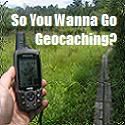So you keep hearing about this "geocaching" thing and you want to know what it's all about.
Well, pull up a chair.
Geocaching is a sport in which the participants try to find a geocache, or "cache" for short, using a GPS (global positioning system) device (although there ARE a few people that use topo (topography) maps but that is a rarity).
From Mirriam-Webster, the definition of "cache":
- Pronunciation: \ˈkash\
- Function: noun
b: a secure place of storage
And when I say "GPS" I'm not referring to the type you use for navigation when you are driving a car. I'm referring to a hand-held, battery powered GPS unit that is designed for hiking use. I usually have an Amazon link in the right sidebar showing an appropriate geocaching GPS - you can click on it to see an example of what I'm talking about.
Besides a cache, and GPS the third component of this sport is the website www.geocaching.com. This website is where all the coordinates for caches are listed. You can go to that website and sign up for a free account, and start searching for caches near your location by punching in your zipcode.
When you are out hunting a cache and you find it, you open the container (the container size and type can vary from a large ammo box down to a small cache that's only slightly bigger than a large aspirin) and inside at the very least there will be a log book or a log sheet for you to sign and date as proof that you have found that cache. If the cache is large enough there usually are "trade items". If you would like to take any of these items (often referred to as "swag" and are generally items worth less than $2.00) you would leave an item of equal or greater value as your trade. Sometimes you may also find geocoins and travel bugs, but I will talk about those later. After signing the log and making any trades, you would reseal the container and rehide it. When you get home, you log on to www.geocaching.com and on the cache page for the cache you found there is a button to "log your find" and you would indicate that you found the cache and leave a message for the cache owner. The website will track your finds for you so over time you can easily see which caches you have found and how many.
This is just a synopsis of what geocaching is about. If you would like to know more, I encourage you to check out "Getting Started" at geocaching.com, as well as some of my other posts like Getting Started.











4 comments:
This sounds like fun! I'm going to sign up and learn more about it. PS - I found your site from the entrecard forums.
This is very interesting to me because I never heard of this before! If it's okay with you, I'd like to share about this on my Friday, "Things I Learned" post with a link back to this post at www.zemeks.blogspot.com. I bet there's a lot of people that have never heard of this before.
Karen & Gerard - feel free to share any info you found here in your post, I'm glad you found it interesting, it's so much fun! And you're right, sometimes I think it's one of those "best kept secrets" and there are still a lot of people that don't know about it. If you have any questions, feel free to ask, and thanks for the link love. :-)
Hey Carole, Wow. Geocaching. Certainly sounds like fun. We love the outdoors with the exception of weather like today, although my husband is originally from Rochester, NY so snow doesn't stop him. But I don't know, he just came in from walking the dogs and didn't look too happy.
Geocaching, so much out there for us to discover and keep us young!
Dianne Chambers
Post a Comment